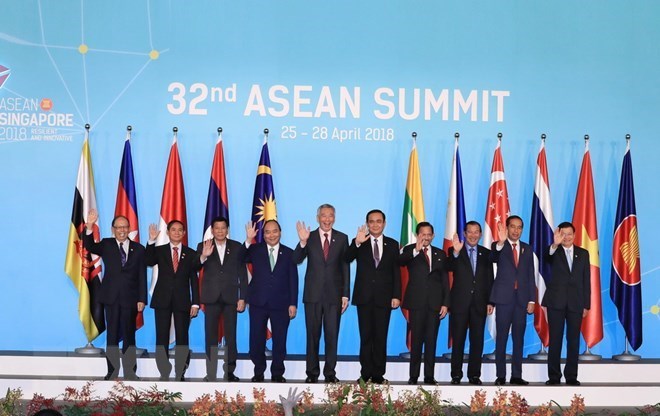Vietnam makes active contributions to 32nd ASEAN Summit: Deputy FM
Thứ Ba, 01/05/2018, 17:45
A Vietnamese high-ranking delegation led by Prime Minister Nguyen Xuan Phuc actively participated in the discussions and gave opinions to the drafting of the documents at the 32nd ASEAN Summit, which was held in Singapore on April 27-28.
 |
| Prime Minister Nguyen Xuan Phuc (the fourth from left) and other ASEAN leaders at the 32nd ASEAN Summit (Source:VNA) |
Talking to the press on Vietnam’s participation in the 32nd ASEAN Summit, Deputy Foreign Minister Nguyen Quoc Dung said PM Phuc expressed his strong support for the theme and priorities of ASEAN in 2018, as well as proposed orientations for strengthening intra-bloc cooperation and between ASEAN and its partners in the spirit of promoting self-resilience and innovation.
The PM stressed that ASEAN needs to improve its self-resilience in all the three pillars, especially fostering solidarity and unity.He added that the economic and financial self-reliance and building a self-resilient ASEAN community in the face of challenges affecting people's lives such as natural disasters, climate change, and epidemics play an important role. He agreed that ASEAN should promote creativity and take advantage of the 4th industrial revolution, and supported the development of the ASEAN Smart Cities Network (ASCN).
Regarding the regional and international situation, PM Phuc and other ASEAN leaders welcomed the positive results of the Inter-Korean Summit on April 27, saying that ASEAN should continue to step up efforts to promote cooperation and dialogue, build trust on the basis of existing stances and principles on the East Sea, and work towards the formation of an effective and legally binding Code of Conduct in the East Sea (COC), thus promoting peace, stability, and cooperation in the East Sea.
According to Dung, the Vietnamese Government leader also stressed that new cooperation initiatives proposed for the Indian Ocean and the Pacific need to contribute to peace, stability and development, and respect the central role played by ASEAN and the bloc’s basic principles and values as well.
Relating to the 4th Industrial Revolution and the trend of smart city development in ASEAN, Dung said the revolution not only opens many opportunities but also poses challenges for ASEAN member countries.
ASEAN leaders said the bloc need to ensure self-resilence, promote creativity and make the most of opportunities from the revolution, giving priority to fostering digital economy and governance, expanding e-commerce, increasing public access to information through digital technology, which are areas of great potential and in line with ASEAN's development needs.
The ASCN is the initiative of Singapore as ASEAN Chair 2018, which aims to materialise the year’s goal of connecting cities within ASEAN, promoting smart urbanisation through applying new technologies and improving the urban management skills to better the living conditions for regional people, he noted.
Smart urban development will be done based on aspects of transport, water resources management, energy, health, education, public service, and information technology. Each city joining the network will build its action plans and promote feasible projects that are tailored to its own needs and interests, in a mutual support basis, he said, adding that Hanoi, Ho Chi Minh City and Da Nang city of Vietnam, and 23 other cities in ASEAN have registered to join this network.
Regarding East Sea-related issues, the Deputy FM said the East Sea situation continued to be a hot topic at the summit.
ASEAN leaders reaffirmed that the maintenance of peace, security, and stability in the East Sea are the common interests and responsibilities of countries in the region, he said.
They insisted that ASEAN should stay united, and firmly and consistently uphold common stance and principles agreed on the East Sea issue, such as ensuring security, safety, freedom of navigation and aviation in the Sea; and settling disputes in a peaceful manner on the basis of international law, including the UN Convention on the Law of the Sea 1982 (UNCLOS 1982), refraining from the use or threat to use forces and militarization; fully and effectively implementing the Declaration on the Conduct of Parties in the East Sea (DOC), and early finalising an effective and legal binding Code of Conduct (COC) of parties in the waters.
The leaders applauded the initial positive progress of the negotiation process for building the COC, which was reflected in the results of the working-level meeting between ASEAN and China held in Vietnam’s Nha Trang city last March. They emphasised the need to build a COC that is practical, effective, consistent with international law and capable of regulating the behaviors of stakeholders, thus contributing to creating a rule-based regional order, for the peaceful and stable East Sea.
VNA

